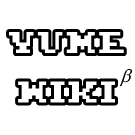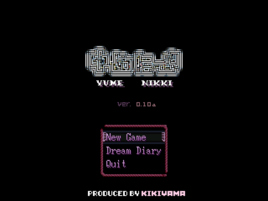Yume Nikki (ゆめにっき, Dream Diary) is a free game made in RPG Maker 2003, created by mysterious Japanese developer KIKIYAMA. It first launched on June 26, 2004 under version 0.00. The latest version is 0.10, which came out on October 1st, 2007. The game hasn't been updated since then.
In Yume Nikki, you play as a girl named Madotsuki who lives in a small room, and refuses to leave. There isn't much to do in her room itself, but once you go to bed you get to explore various worlds within her dreams, in search of 24 "effects".
The gameplay of the game itself is similar to that of Yume 2kki, you go to sleep and explore different dream worlds, some ominous, some cheery.
The game became so popular to the point where it has garnered a sizable fanbase, who have since created countless fangames, such as Yume 2kki. For more information, please see the Yume Nikki Wiki.
Controls
- Arrow keys to move.
- Action key to interact.
- 1 key to use an effect.
- 3 key to use an effect (only the Midget).
- 5 key to drop an effect (only in The Nexus).
- 9 key to pinch yourself awake.
- 0 or X key to open up the menu.
Download
Yume Nikki v0.10
References in Yume 2kki
Yume 2kki is one of the most popular fangames out there, alongside games like .flow, Me, Yume Nisshi, Yume Graffiti and Fleshchild, to name a few.
Since Yume 2kki is also the supposed "sequel" to Yume Nikki, it has been heavily influenced by it and contains a lot of references to the original game.
- The game's name in the first place is a pun on the original "Yume Nikki", since "ni" in Japanese is also the number two, hence "Yume 2kki".
- Urotsuki's name is quite obviously based off of Madotsuki's name.
- A lot of the endings are parodies of the ending of Yume Nikki.
Locations
- The Shield Owl World greatly resembles the Shield Folk World from Yume Nikki. Even their fan names are similar in this regard.
- The Abandoned Factory can be seen as a reference to the Sewers, where Big Red is found.
- You could say the Dark Forest is reminiscent of the The Dense Woods.
- You could also say the Forest Pier is reminiscent of the Witch's Island (Ironically, the Dark Forest and the Forest Pier are completely unrelated and isolated from each other, despite this).
- The Neon City is visually similar to the Neon World, yet also thematically similar to the White Desert.
- It's possible that Marijuana Goddess World was in-part inspired by the Graffiti World because of the different tiles that make noises when you step on them.
- Forest World, the Digital Forest, and the Evergreen Woods all resemble Forest World, with their trees and crops.
- The Dressing Room in Urotsuki's Dream Apartments has an unreachable mannequin bearing the window from Madotsuki's shirt.
- Both the Hidden Shoal and the False Shoal are references to The Pink Sea.
- The old UFO vaguely resembled Masada's ship.
- The Baddies Bar is very similar to Number World in terms of design, while also similar to The Torinigen Party in the aspect that they are both places that Chasers hang out.
- The Mask Folks Hideout also has a similar structure to the Number World.
- A portion of the ground in the Extraterrestrial Cliffside bears a strong resemblance to Uboa.
- The GB Fields also have something like this.
- Marina's House (externally and internally) resembles Poniko's House. You can even turn the lights off!
- Static Noise Hell resembles Hell in terms of appearance, and the crossroad where you start off is reminiscent of its lesser counterpart, Mini Hell, complete with a transparent Urotsuki standing in the center.
- Gray Relic World heavily resembles Mural World in appearance and design.
- The Windows key of Matoran Keyboard is labeled with the window from Madotsuki's shirt.
- The overall layout of the Obsidian Plains is a direct reference to the Forest World.
- The Gulliver Desert bears a striking resemblance to the White Desert, down to the way its sub-areas are accessed.
- The room that houses the Child effect in the Pyramid Maze has Madotsuki's shirt pattern on the rug. Additionally the mural on the wall appears to showcase a figure resembling Madotsuki in front of several kneeling children, one of them appearing to resemble Urotsuki.
- Ahogeko's House in the False Shoal is a direct reference to Poniko's house, as well as featuring an Uboa-like event.
- Said event takes you to the 3D Structures Path, which eventually ends up in Aooh's Trap, a direct homage to Uboa's Trap.
- The Second Nexus is reminiscent of Yume Nikki's Nexus, even more so compared to the regular one.
- Both the Broken Faces Area and the depths of the Sugar World are similar to the Eyeball World, as they all have body parts littered throughout the world.
- The Rainfall Ruins are very similar to Ghost World as they both are a labyrinth of large angled blocks.
- Inside a room at the Highway, there are flowers that transport you to Downfall Garden A when you interact with them. This is similar to the flowers that transport you from the Sky Garden to the Ghost World in the original.
- The Acerola World is very similar to the Guillotine World: both are small looping areas housing an effect, several chasers, holes in the floor, and an ambiguous exit.
- The RGB Passage resembles the Neon Tile Path and even has a similar entrance.
- The Teleport Maze resembles the Teleport Maze.
- The Floating Red Tiles World resembles the Checkered Tile Path.
- The stairs which lead to the Haniwa Temple resembles those in the Wilderness.
- Pudding World features pudding lit with candles, as well as walking pudding creatures; this is similar to Candle World.
- The Ash Settlement in the Scorched Wasteland is similar to the Barracks Settlement.
Events / NPCs
- By interacting with the yellow-tinted window in the Never-Ending Hallway, the Madotsuki's Room event begins, with the player being trapped for a period of time in a glitched out version of Madotsuki's Room before the screen completely fades to static.
- The Red Nail Passage in Nail World has pillars across it. Upon interaction, they make an image appear on the screen for a few seconds. This is similar to the Drawings in the Sewers event in the Sewers, in which there are pictures that appear when interacting with the holes in the wall.
- In the Sky Kingdom, there is an NPC that looks a lot like the infamous Uboa from Yume Nikki, nicknamed Dogboa. Older versions of Marina's House featured another reference to Uboa, nicknamed Not!Uboa, but all connections to it have since been removed.
- Interacting with Hiboushi outside of the Apartments yields a close-up of her face reminiscent of Monoe.
- White Fern World contains several creatures that bear a similar design to the Floyag.
- The first channel in the TV Room is an Aztec creature that greatly resembles the Aztec Rave Monkey. The same creature appears in the parallax background of Shield Owl World, Cosmic World, and the Radiant Ruins, perhaps in reference to the same thing happening in Yume Nikki's Forest World and Block World. A similar event occurs in the Ancient Crypt. Channel #10 features Urotsuki spinning around like Monko's full-screen event, and channel #16 is a reference to the KALIMBA TV Channel event.
- There is an NPC in Pillars World that mirrors Onsen-San.
- The Streetlight Garden also features a character like this, nicknamed Onsen's Cousin.
- There is a monster who gives a menu theme in the Bloody Passage who also bears similarities
- There's a random chance in the Neon City you might stumble across It Came From Behind, a red character that floats across the screen for about three seconds while making a noise, in a similar manner to Takofuusen. Similar events can also occur in Paradise, Word World, the Neon Sea, and the Monochromatic Abyss.
- The Abandoned Factory contains an event where Urotsuki is eaten by a large red monster, similar to Big Red, and taken to a dark world with pinwheels and a multicolored panorama, similar to Windmill World.
- The Flashing Trombonist and Candyman in Sugar World are both NPCs that resemble Strober.
- The Evergreen Woods is filled with lizard-like creatures known as Tokage, most likely referencing Namekuji.
- The Purple World is populated by many magenta creatures who bear resemblance to those which inhabit the Ghost World.
- Both Flying Events are references to the original Witch Flight event.
- The Dead Figure who gives you the Stretch effect seems to reference Shitai-san, who also gives you an effect in the original.
- By reaching the end of the Zalgo area, you will find a blue, one-eyed creature who is based on Mars-san.
- Ending ? is a direct reference to Yume Nikki's ending, even requiring 24 effects to get it.
- A six pane window resembling Madotsuki's shirt pattern appears in the third ending, as well as a Madotsuki doll for a brief moment.
Soundtrack
- The default theme of Urotsuki's Computer is an arrangement of Yume Nikki's ending theme.
- The BGM of the Mirror Room in Jigsaw Puzzle World is Yume Nikki's save theme played backwards.
- The music of the Madotsuki's Room event is an odd rendition of the NASU music from the original game.
- The BGM for Bleak Future is Yume Nikki's save theme reversed.
- The BGM that plays in the Child effect room is an arrangement of Yume Nikki's title theme.
- The BGM of Ahogeko's House is very similar to that of Poniko's House.
- In addition, the monster room here has a similar track to that of the Hot Springs House in Yume Nikki.
- The BGM of the Second Nexus is similar to Madotsuki's Dream Room.
- The BGM played in the Neon Faces World is similar to Mural World's.
- The Red Sky Cliff features music similar to the Martian Underground, and the leitmotif is used in a lot of spelude's tracks.
- Older versions of the Apple House played a melody that was similar as well.
- Oni Musume's Room and the Black Building both play a rendition of the game's title screen, similar to how the Mall Rooms do the same with the original's title theme, respectively.

